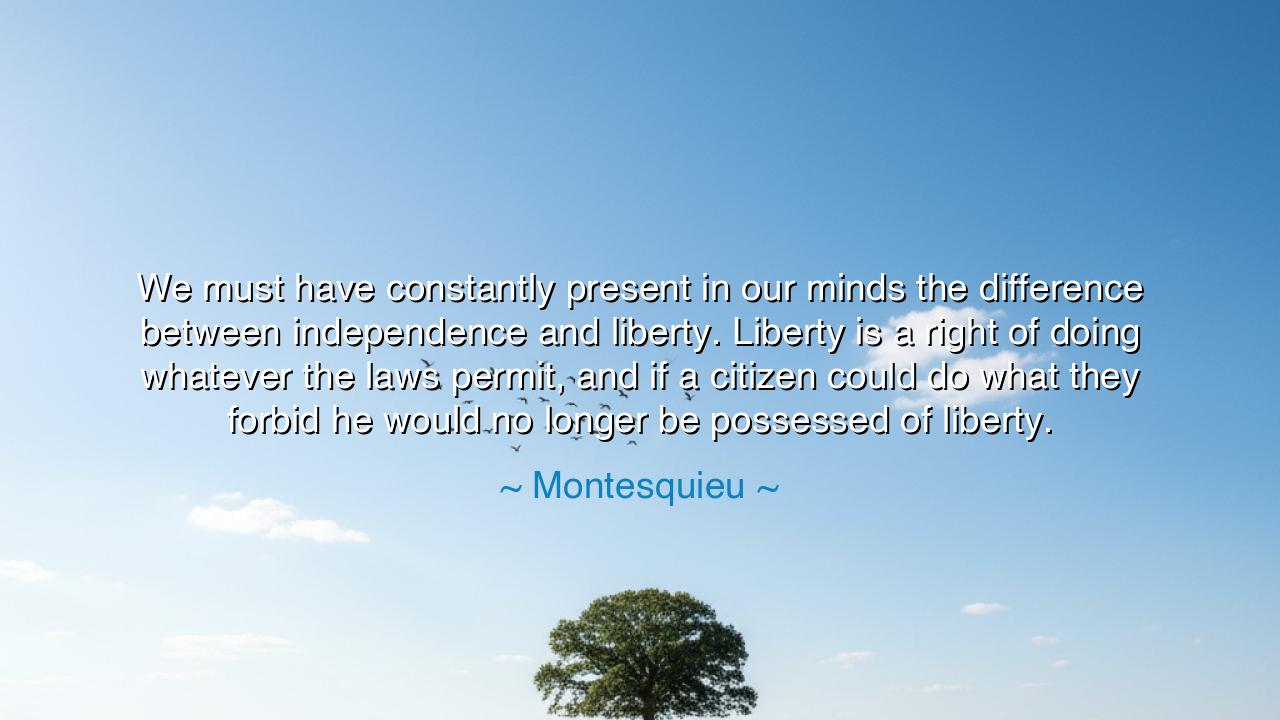
We must have constantly present in our minds the difference
We must have constantly present in our minds the difference between independence and liberty. Liberty is a right of doing whatever the laws permit, and if a citizen could do what they forbid he would no longer be possessed of liberty.






Hear now, O children of wisdom, the words of Montesquieu, whose voice resonates through the corridors of time with a truth about the nature of independence and liberty: "We must have constantly present in our minds the difference between independence and liberty. Liberty is a right of doing whatever the laws permit, and if a citizen could do what they forbid he would no longer be possessed of liberty." These words, though ancient, carry with them the weight of eternal wisdom, urging us to understand that liberty and independence are not the same, and that the foundation of liberty lies in the structure and limitations of law.
Independence, O children, is the ability to stand alone, to be free from the control of others, and to determine one’s own course in life. It is the freedom to make decisions without external restraint. Liberty, on the other hand, is not the absence of restraint, but the presence of laws that permit certain actions while forbidding others. Liberty is the right to do what the law allows, and it is through this structure that society maintains order and justice. Montesquieu teaches us that liberty does not mean doing as one pleases; rather, it means acting within the bounds set by society to ensure the common good. Without these limits, true liberty would not exist.
Consider the ancient Greek philosopher Socrates, who, despite his wisdom and virtue, was sentenced to death by the very society that once celebrated him. He was charged with corrupting the youth and impiety—charges that reflected the values of his society. Socrates could have chosen to flee, to claim independence from the laws that bound him, but instead, he chose to submit to the will of the Athenian court. His death was not a denial of his independence, but a demonstration of his commitment to the laws of his city-state. Through his sacrifice, Socrates illustrated the very essence of liberty: that true freedom lies not in the absence of law, but in its structure, its justice, and the moral duty to abide by the laws that govern society.
Look also, O children, to the story of William Wallace, the great Scottish hero, who fought for independence against English rule. Wallace’s battle was a fight for freedom from tyranny, but his struggle did not seek to eliminate the concept of law or order. Rather, it was a call for a system of justice where the people were governed by their own laws and not those imposed by a foreign king. Wallace’s fight for independence was a fight to create a system in which liberty could be enjoyed—where the laws of the land would reflect the will of the people, and not the demands of a distant ruler.
However, Montesquieu warns us that liberty is not an unchecked freedom. To be truly free, one must live within the boundaries of the law. If a citizen were able to do whatever they wished, bypassing the laws that govern them, they would be in danger of losing their liberty. The laws serve as the scaffolding that upholds the structure of a just society, ensuring that individual freedom does not infringe upon the rights of others. This balance between independence and liberty is what creates the conditions for peace, justice, and prosperity in any society.
Consider, O children, the story of the American Revolution, where the colonists fought not only for independence from British rule but for a new system of laws that would ensure the liberty of all citizens. Thomas Jefferson and the Founding Fathers crafted a Constitution that would protect the liberty of individuals, but also ensure that those liberties were protected within the bounds of law. They recognized that while independence from a tyrannical ruler was vital, it was equally important to create a government based on laws that would preserve the liberty of the people without descending into anarchy or lawlessness.
The lesson, O children, is clear: independence is the freedom to act on one’s own, but liberty is the freedom to act within the framework of just laws. True liberty does not mean lawlessness, nor does it mean the freedom to harm others or to act without regard for the greater good. It means the ability to act freely within a structure that protects and upholds justice for all. Montesquieu teaches us that to truly understand liberty, we must understand the importance of the laws that govern us, and the role they play in ensuring that freedom is not a privilege for the few, but a right for all.
So, O children, let us walk the path of liberty with wisdom, remembering that it is not the absence of law, but the presence of just laws that allows us to flourish in our freedom. Let us seek to create societies where the laws protect the rights of the individual while ensuring the common good. In doing so, we will honor the true meaning of independence and liberty, and create a world where freedom is not a fleeting concept, but a permanent condition for all.






AAdministratorAdministrator
Welcome, honored guests. Please leave a comment, we will respond soon